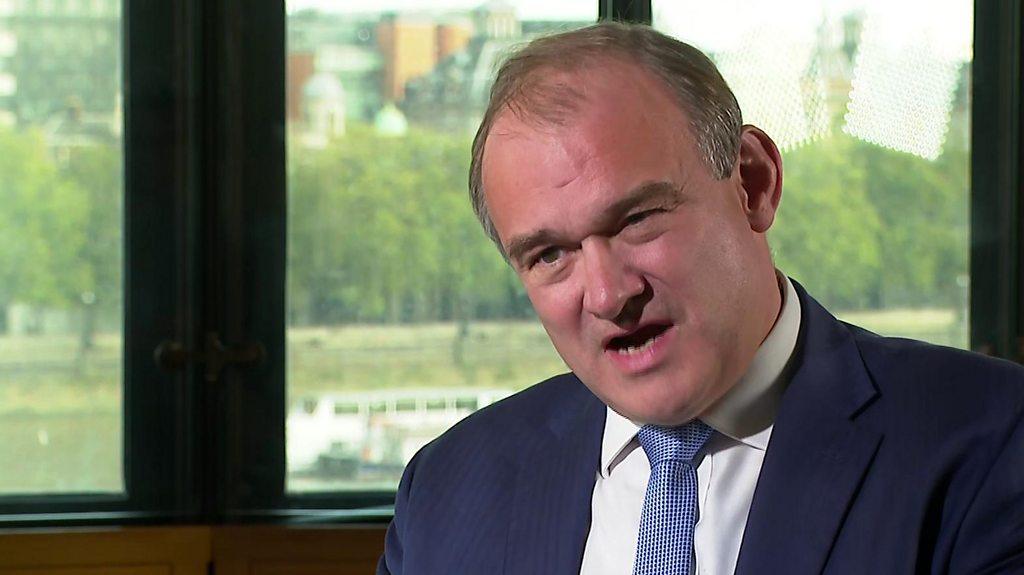Lib Dems: Uneasy party ponders long road back to EU
- Published
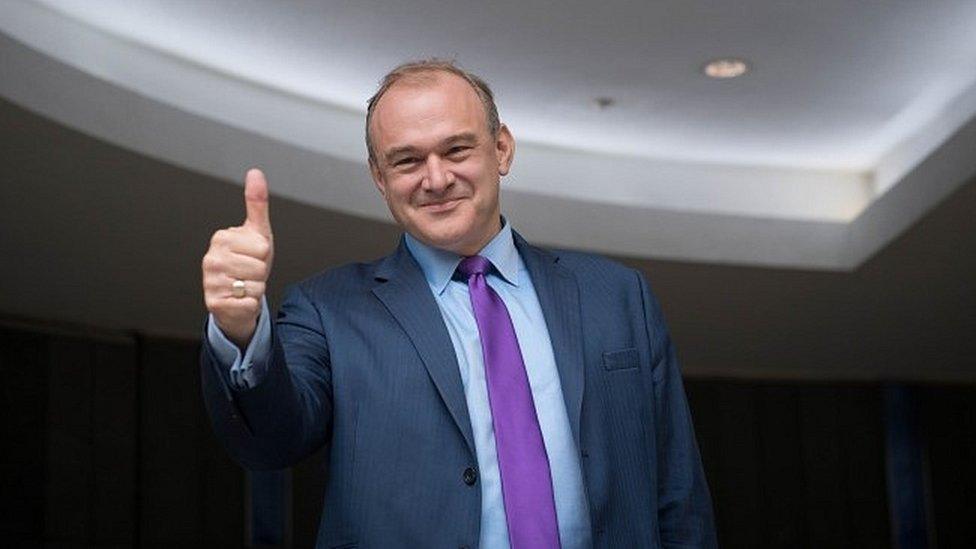
Sir Ed Davey's apparent reluctance to commit to re-joining the EU set the cat among the pigeons
Where do the Lib Dems stand on rejoining the EU? That is the question they need to answer if they are ever to find their way out of the post-Brexit wilderness.
In one short sentence, Sir Ed Davey appeared to have thrown away everything the Liberal Democrats have fought for in recent times.
Asked by Andrew Marr about the party's stance on rejoining the European Union, the Lib Dem leader said: "We are not a re-join party, but we are a very pro-European party."
Given that the Liberal Democrats adopted a policy at their party conference last year of supporting UK membership of the EU in the long term, members were quick to react.
"I was shocked and angry," said George Potter, a Lib Dem councillor in Surrey, describing Sir Ed's comments as "a complete contradiction of party policy".
People higher up the party ranks were also alarmed, with at least one senior figure calling the leader straight away to seek an explanation.
Sir Ed's choice of words may have been an attempt to avoid a narrow line of questioning about when and how the UK might be able to regain membership of the EU, but the statement was too blunt for many.
Damage limitation
Something of a damage limitation exercise was undertaken, including a Zoom call with MPs and others during which the leader apologised for what some saw as an error of judgement.
A few days later the leader wrote a blog post, external further clarifying his position, stressing the Liberal Democrats were "committed to the UK being members of the European Union again".
Sir Ed Davey insists that while members may have "misinterpreted" what he said on the Marr programme, once he was able to clarify his answer "people were completely relaxed".

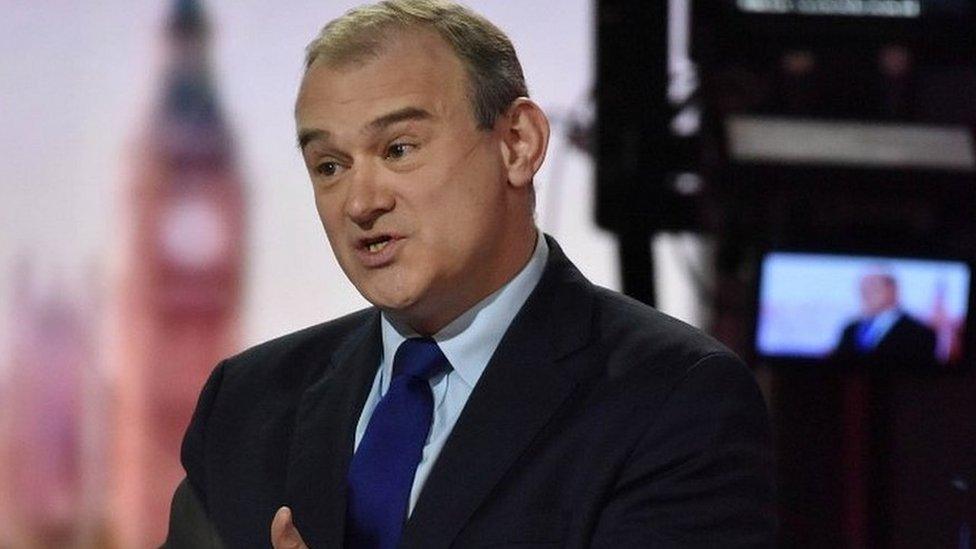
Who is Ed Davey?
Defeated Layla Moran to become leader last August
Energy and climate secretary in the Lib Dem-Tory coalition
Lost both his parents before the age of 15
His wife Emily is a councillor in Kingston, where he is an MP
Cares for his son, who has a rare neurological condition

"What we're doing now is campaigning on the recovery from coronavirus but it doesn't stop us talking about the EU," he told BBC News.
A senior party source suggested a full-on re-join campaign now would leave the Lib Dems looking "out of touch with what's going on".
But while there is no denying the need for any political party to be seen to take a stand on the most pressing crisis the country has faced in decades, many Lib Dems are impatient to see the issue of EU membership prioritised once again.
But how best should they make the case? Life was easier when they were campaigning flat out to stay in the EU.
"What Brexit did is give us a clarity of message we've rarely had, the kind of thing we always said we craved - a really clear simple purpose," says former party leader Tim Farron.
'Cool-headed'
As someone who went through the media mill when he was leader, he has some sympathy with Sir Ed over his Marr interview.
"I understand why it caused some trouble, but he was bowled a googly, kept his wicket and allowed to bat the rest of the over," he said.
He urged the party to be "cool-headed" in its approach to rejoining the EU, and to avoid at all costs being drawn into a "culture war" with the Conservatives on the issue.
The majority of Lib Dems would accept the road to re-joining the EU will be a relatively long one with no guarantee of reaching the destination - but some are keen to at least set out the route.
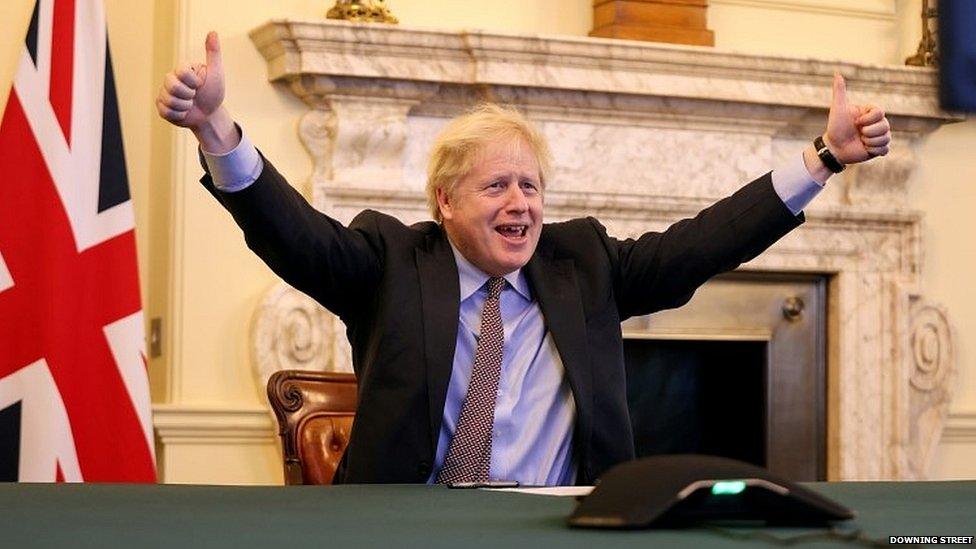
The party believe the shortcomings of Boris Johnson's trade deal with the EU will soon become apparent
"We do need to show a way back here that's going to put us in a position to rejoin as a future date, if the stars were to align and we'd be able to do that as a country," argues Alistair Carmichael, the Lib Dem MP for Orkney and Shetland.
He recently said the UK should join EFTA, the organisation with access to the EU's single market but without membership of the bloc, as soon as possible.
Some grassroots see it as the party's job to speak up for those who want be back in the EU - but others suggest that taking a "rejoin now" approach will damage the argument in the longer term.
Councillor John Potter (no relation to his Surrey colleague) argues that highlighting the economic impact of Brexit and the consequences of Boris Johnson's trade deal with the EU are the best ways to make the case for EU membership in the longer term.
"The Brexiteers and Johnson government have to own what is coming their way," said the Preston councillor, who hosts the Lib Dem podcast, external.
Sir Ed appears to agree, telling the BBC: "I'm pretty firm that this trade deal is a disaster and we will make the argument that the single market and customs union are things we should be backing and campaigning on."
Scottish challenge
This could be a make-or-break year for the Lib Dems in Scotland, where they have sunk to just five seats out of 129 at Holyrood.
The party's cause - ahead of elections in May - was not helped by Sir Ed's Marr interview, according to insiders.
"Some people there had some questions to ask," says a senior party source, with a hint of understatement.
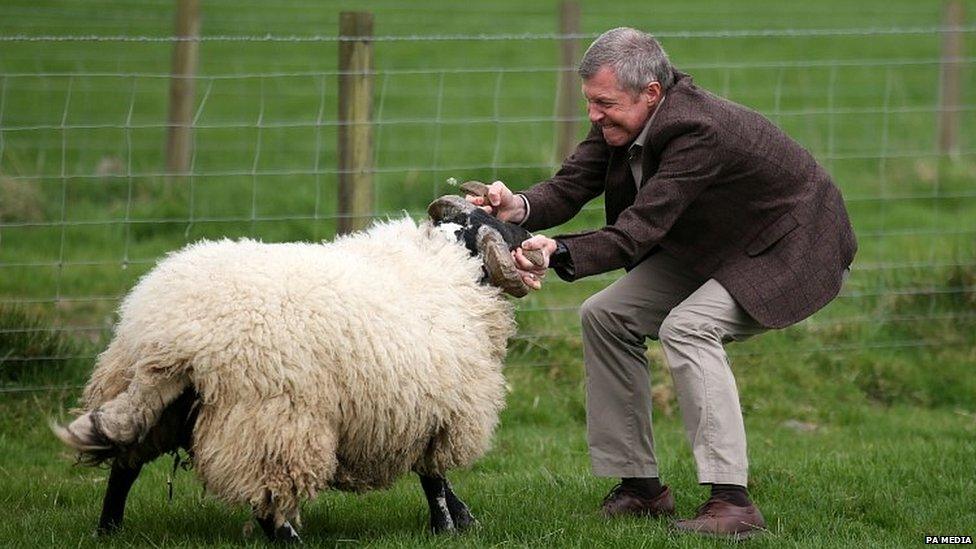
The Lib Dems have a fight on their hands to resist the separatist tide in Scotland
Being pro-union, and pro-EU, is central to the party's offer, setting them apart from the dominant SNP.
"In Scotland it's particularly important that people know that the party is absolutely clear that we are a party that wants to remain in the UK and works toward that eventual end goal of being able to return," said Edinburgh West MP Christine Jardine.
"You don't argue in favour of joining one union by breaking up another."
The Lib Dems' leader in Scotland, Willie Rennie, agrees. "We shouldn't repeat the mistakes of Brexit with independence," he says. "Independence would be Brexit on stilts."
Separating those two issues will be one of many challenges for the Lib Dems at May's polls.
A fantasy or the future?
Any Liberal Democrat will tell you that optimism is an essential quality to remain committed to the cause of a party firmly back in the margins of British politics.
But Sir Ed Davey is clearly keen to administer a dose of realism for those daring to dream that rejoining the EU might be within the UK's grasp.
"We get that we lost the battle to stop Brexit," he wrote in his blog post to members last month.
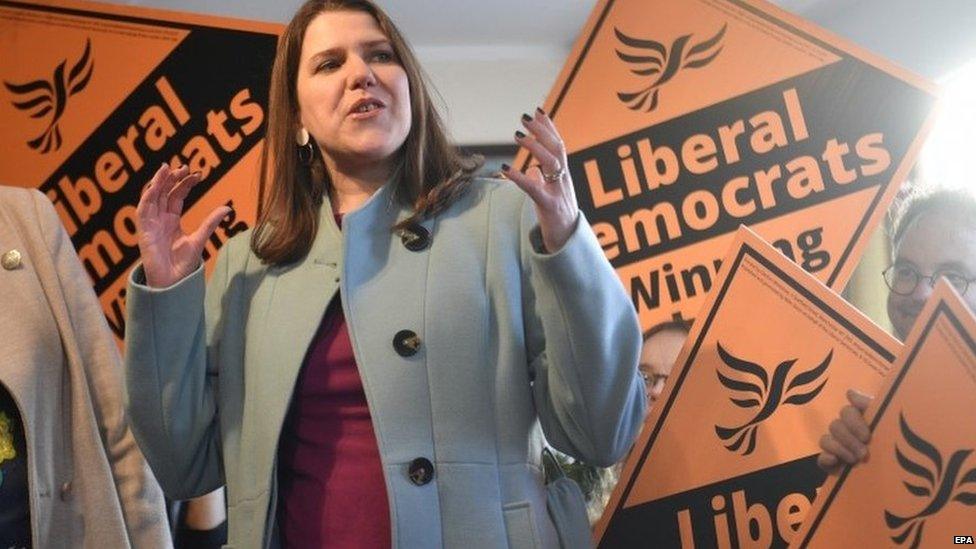
Jo Swinson's defeat at the last general election was a body blow for the party
When former leader Jo Swinson lost her seat at the 2019 general election it seemed the party was at rock bottom and the Lib Dems have seen their support remain stagnant at about 7% in UK-wide opinion polls since.
But there is more than blind hope in the arguments of those who see rejoining the EU as something which the UK can and should achieve in the not too distant future.
So how long might it take and what conditions would have to present themselves for what seems politically impossible in 2021 to become a reality?
Tim Farron predicts "two years of the emotional stuff" where anyone criticising the post-Brexit trade deal will be "dismissed as whining Remoaners".
But after a "practical assessment" about the economic impact of Brexit "from Conservative backbenchers as much as anywhere else", he predicts the arguments will start to be made for a closer relationship with the EU.
Over the next five to 10 years, the UK will "slowly but surely align" with European regulation and "there's a 75% chance of us being back in the EU in a generation," he suggests.
In Lancashire, there's more optimism.
"Within 10 years we might be some way back," John Potter suggests. But the local activist does not expect to see even the Lib Dems campaigning to re-join the EU as a priority at the next general election.
"Possibly the one after that," he offers tentatively.
From the top there is unsurprisingly a reluctance to offer any time scale but Sir Ed Davey too predicts a slow and steady increase in support for a closer relationship with the EU.
"I think the arguments I've been making now for much close trading relationship will gather some steam and support among others who might've been more sceptical.
"Focusing on the trading relationship will gradually, hopefully, change people's minds over time."
Along with being optimistic, Liberal Democrats are used to playing a long game. Left wounded in their post-Brexit political wasteland, they are tentatively regrouping for perhaps the longest game yet.
Related topics
- Published23 January 2021
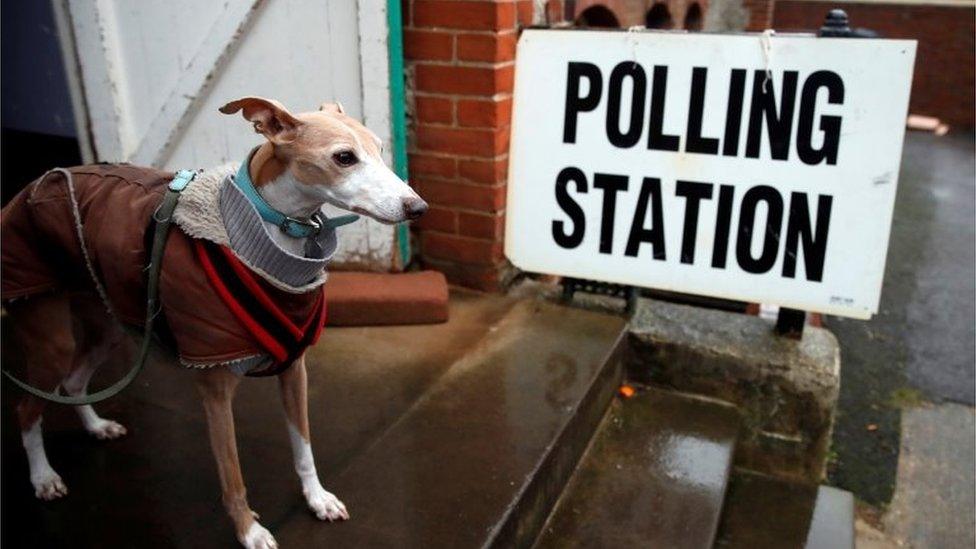
- Published26 December 2020
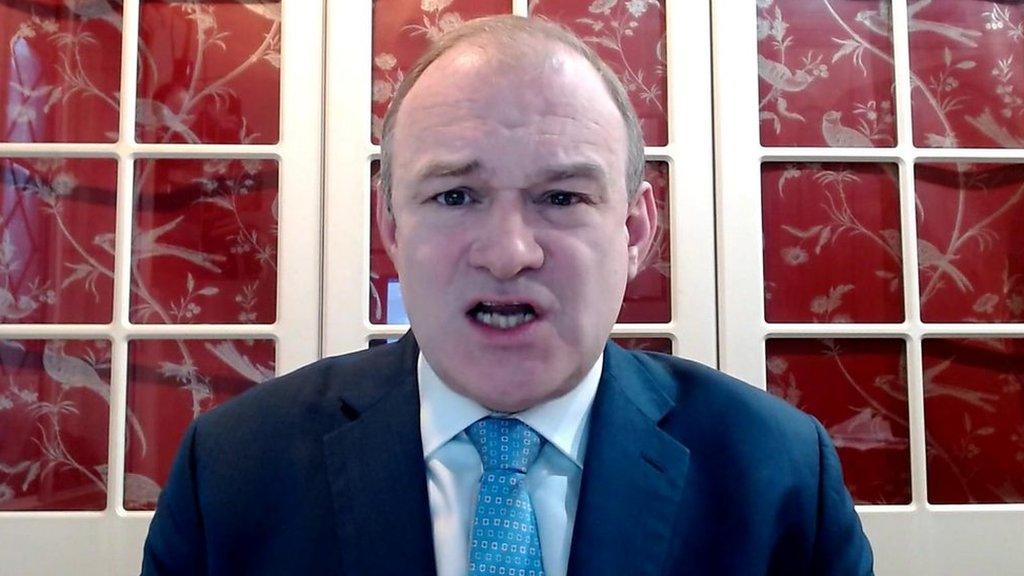
- Published26 September 2023
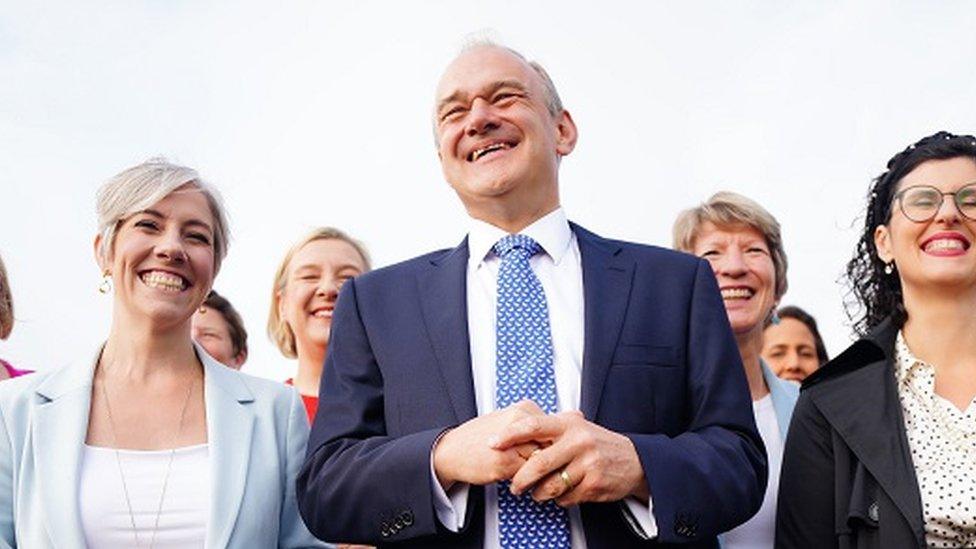
- Published28 September 2020
